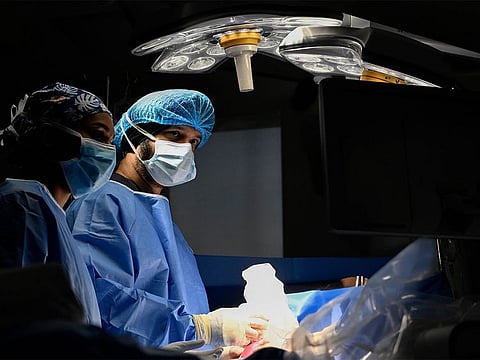From surgery inside womb to 135 days in NICU: An Emirati baby’s incredible fight for survival in UAE
Multiple complex procedures done before and after birth for severe diaphragmatic defect

Abu Dhabi: From the 12-week foetal scan during which a serious defect was detected to undergoing surgery inside his mother’s womb, a specialised EXIT procedure at birth, and another major surgery to repair his diaphragm at six days old, baby Saif’s arrival into this world was fraught with challenges.
After a 135-day stay in the NICU at Burjeel Medical City (BMC), Abu Dhabi, the little one emerged victorious, and is set to go home with his parents. Baby Saif’s parents, an Emirati couple from Al Ain, are relieved by the miraculous recovery of their newborn son following a complex medical journey that began even before his birth.
A difficult diagnosis
Latifa and her husband were overjoyed when they learned they were expecting their first child after five years of marriage following IVF (In vitro fertilisation). Their initial excitement turned into a concern after a 12-week scan discovered that the baby had a serious diaphragmatic defect, causing his bowel and liver to herniate into the thorax.
The diagnosis was a blow to the couple. “It was difficult to hear that our baby might not survive due to his complex health condition or that the pregnancy might not be completed,” recalls Latifa. They sought out specialists who could provide assistance and finally consulted Dr. Mandeep Singh, Consultant, Fetal Maternal Medicine and Obstetrics, Kypros Nicolaides Fetal Medicine and Therapy Centre at BMC. Learning that specialised care was available within the country, they decided against travelling abroad for treatment.
“As the pregnancy advanced, it was clear that the defect was severe, and this had led to both lungs being severely compressed. The chances of the baby surviving with such a serious defect are around 10-15 percent. Their only hope was to undergo a complex in-utero procedure called FETO procedure (Fetal endotracheal occlusion procedure), in which a balloon is placed in the baby’s trachea using a fetoscope to encourage lung growth,” said Dr Mandeep, who led the team of doctors managing the case. Other members of the team included Dr Iviano Ossuetta (Consultant and Director of Neonatology), Dr Mussadaq Inayat (Consultant Neonatologist), Dr Ahmed Omran (Consultant Obstetric Anesthesiologist), Dr Shaikh Irfan Basha, (Consultant Otorhinolaryngology, Head and Neck Surgery), Dr Rajasekhar Cingapagu, (Specialist, Pediatric Surgery), and Dr Kesava Ramakrishnan (Consultant Pediatric Intensive Care Unit).
When Latifa first heard about the interventional procedure that would take place when her baby was still in her womb, she was filled with fear and anxiety. However, the medical team reassured the couple and they decided to go ahead with the procedure.
Overcoming challenges
At 27 weeks’ gestation, the FETO procedure was performed successfully with the help of Dr Mauricio Herrera, a visiting physician and fetal medicine specialist. However, the mother faced a setback when she went into preterm labour shortly afterwards and started leaking amniotic fluid. With careful management, the pregnancy continued, and Latifa stayed in the hospital for the remainder of her pregnancy.
At 34 weeks, when she went into labour, the medical team performed a specialised operation known as EXIT (Ex-utero intrapartum treatment), which allowed the baby to be partially delivered while still attached to the placenta, allowing him to receive oxygen from his mother as the medical team stabilised his breathing before delivering him.
During this time, Dr Irfan Basha punctured the balloon and inserted an endotracheal tube to help Saif breathe. The baby was then delivered and transferred to the NICU. On the sixth day after his birth, baby Saif underwent major surgical repair of the diaphragm by Dr Rajasekhar.
For Latifa, seeing her baby in the intensive care unit for premature babies (NICU) brought mixed feelings of pain, joy, and fear. The couple traveled daily from Al Ain to Abu Dhabi to be by their baby’s side and ensure he received the best care possible. “It was a challenging time. My husband and family supported me, giving me the confidence that this would pass. The hospital felt like a second family, providing us with compassionate care. I am grateful to the UAE for its advanced healthcare system, which allowed us to stay close to our family and loved ones,” said Latifa.
Getting ready to go home
Four-and-a-half months later, baby Saif is all set to go home soon. “We are very pleased that baby Saif’s condition has greatly improved. In the last few months, he has overcome critical health challenges as our entire team worked together to deliver the best care. We are hopeful that we can continue to offer this treatment to any baby in a similar situation,” said Dr Mandeep.
The Kypros Nicolaides Fetal Medicine and Therapy Centre in Abu Dhabi has successfully managed numerous complex congenital malformations. It is one of the first centers in the UAE to perform in-utero spina bifida repair and continues to perform many such successful procedures.
Sign up for the Daily Briefing
Get the latest news and updates straight to your inbox



